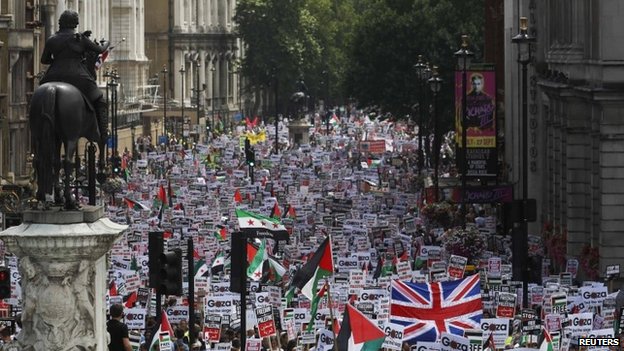From Palestine to parenting, we’ve lost the art of good faith
written for The Telegraph, 21 July 2014

Gaza supporters march through Whitehall – and are photographed for the BBC
The first casualty of war is decency on the internet. Even my most thoughtful friends have become monsters in cyberspace this week. Hamas sympathisers tweet what Brendan O’Neill calls our “moral pornography”, photographs of mutilated children, often of dubious provenance, while Israel’s most aggressive defenders accuse everyone in sight of wanting to wipe out world Jewry. The claim that Jews specialise in killing children is an old lie, which is why many feel so viscerally threatened by the spread of these images – many, like the one tweeted by BBC correspondent Jon Donnison, actually showing Syrian children.
But this isn’t just an expression of online rage over a particular conflict. It emerges, on all sides, from a deep culture of victimhood, a certainty of one’s opponents’ bad faith. And it often emerges from being treated with bad faith: take the case of Mehdi Hasan, who despite being Huffington Post Political Editor, and lead Al-Jazeera interviewer, complains frequently that Muslims don’t have much of a voice in the mainstream media. As one might tell, I’m no fan, but he’s become noticeably more aggressive since a mosque video leaked showing him telling fellow worshippers that those without true faith are like “cattle”. Hasan was torn to shreds by his critics, and I admit, I too was fairly incensed: until I remembered that I’ve been listening to Christian sermons for 20 years in which believers and unbelievers are divided into sheep and goats. I won’t be suddenly subscribing to Hasan’s every broadcast, but it only took a little good will to recognise that if he believes in his faith, he has every reason to consider that those who lack it fail to fulfill their souls’ full potential – and to express this point in figurative terms without being a mad mullah.
But once burned by others’ lack of good faith, most of us lose our own. And, perhaps because he has experienced it, Hasan is certainly the first to accuse people of Islamophobia at all opportunities, and has emerged as a leader in the Twitter discourse of a group of British Muslims who talk at length about media prejudice against Gazans. The BBC has long been accused on all sides of bias – in 2004, the Belan Report into anti-Israeli bias was considered so explosive it was never made public; a counter report, in 2006 largely cleared the BBC, only to be forensically lambasted by Martin Walker in The Times, who pointed out the BBC had defended Fayad Abu Shamala, a BBC reporter who told a Hamas rally that journalists like him were committed to “waging the campaign shoulder to shoulder together with the Palestinian people”. And so it was that I logged into Twitter on Saturday, to find half my timeline copying Salma Yaqoob’s complaint that the BBC hadn’t given any coverage to thousands of protesters marching through London to condemn Israel’s operations in Gaza. Except, of course, it had. The other half was conducting a raging battle over whether or not there were anti-Semitic slogans at the march. Reasonable people, people I have respected for years, found themselves arguing that those who claimed to have seen anti-Semitic slogans had made the whole thing up. They might have made a good case that marches always bring along a few weirdos and fringe types. Instead, they assumed bad faith on the part of anyone who raised concern – including the Holocaust survivor of my acquaintance who spent her 93rd birthday watching a section of the crowd call Jews “a race of bloodsuckers”.
And when the Holocaust is involved, whatever the angle, we are too quick to assume bad faith. Like many, I was horrified this weekend to see a viral photograph of a grinning blonde, trussed up in garish pink, calling herself “Princess Breanna” and smiling for a selfie at Auschwitz. Two minutes research tells me that, while Breanna might not be my first choice for a Proust reading group, she’s smiling because she’s succeeded in making a pilgrimage she promised her dead father they would make together. A narcissistic over-sharer? Maybe. Completely ignorant of the significance of her location? Probably not. But it’s more fun to pick up a pitchfork than ask for an explanation. Why else would a helpful soul in South Carolina have called the police, this week, to accuse McDonald’s worker Debra Harrell of child abandonment because she let her nine-year-old play alone in the park, instead of asking if she could afford childcare?
So if I ask you to prove your photograph of a child is really from Gaza, not Syria, don’t accuse me of being an Israeli stooge. If I refuse to pass on RT the latest PR missive from the IDF, don’t call me an Hitler apologist. For everyone’s sake, let’s have a little good faith.




